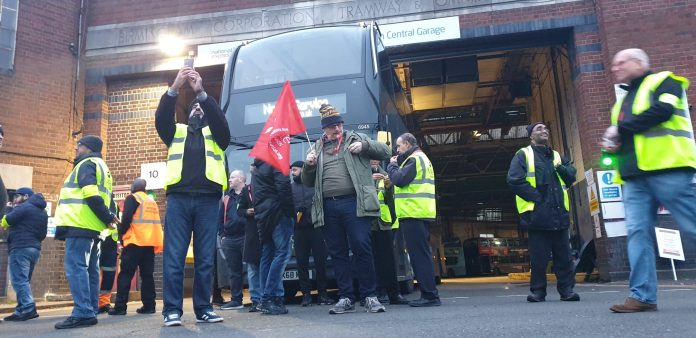Nick Hart, Birmingham Socialist Party
There was an incredible display of workers’ power on Monday 20 March, as 3,100 bus drivers at National Express West Midlands began all-out strike action for a living pay increase, after years of declining real wages.
The strike follows management attempting to tie workers down to a three-year deal on pay, while employing underhand tactics, including attaching leaflets to duty cards recommending acceptance of the deal, in the snap ballot organised by Unite the Union last week.
The rock-solid support for the strike was shown in the mass pickets from 3am at garages around Birmingham, the Black Country and Coventry. Socialist Party members report that, despite the company’s attempts to run a skeleton service, at most locations the number of buses that went out could be counted on one hand.
In a desperate move, managers at Birmingham Central called the police to try and disperse the 40-strong picket. Drivers were quick to point out the irony of being unable to get back-up to deal with violent and antisocial passengers while at work, but having three riot vans called to stop union members enforcing the strike! Meanwhile, at Perry Barr, pickets were stood stationary in front of the gate as management tried to guide a bus slowly out of the garage. The bus nudged a picket, so was stopped and reversed back into the garage.
One driver at Birmingham Central summed up the mood as being “undervalued, underpaid, overworked and underappreciated”. To emphasise the point, one of the drivers showed us his four licences, each for a different vehicle class, and described it as insulting that some describe his job as being low-skilled.
Talk also turned to the conditions of the job. One worker at Yardley Wood said: “It’s not even about the money, it’s the amount of time we’re in the saddle. You’re lucky if you get a break for a coffee.” Their workmate added that there are drivers going through divorces thanks to the pressure of the job and the amount of time they spend in work.
We heard how drivers don’t get access to proper toilet facilities while away from the depot. In other countries, such as Denmark, bus companies have to provide these by law. This is despite the fact that unpaid breaks of up to four hours during the day are common, with eleven hours between the start and end of duty.
A driver at Coventry explained: “I’ve been working here for 15 years, and it feels like all the time management trust us to do our jobs less and less”. Other workers there were angry at National Express making millions in profits while claiming to be unable to afford to pay drivers a living wage.
Drivers at Acocks Green enthusiastically received the second edition of the Socialist Party’s strike bulletin, and agreed with the demand for a 24-hour general strike to win a living pay rise for all workers.
At the time of writing, Unite members at National Express West Midlands are set to stay on strike continuously until a satisfactory deal is reached. In just one day of action, bus drivers have succeeded in emptying out a number of town and city centres around the region, showing their vital role in keeping the local services and businesses running.
Time for these essential workers to be paid a real living wage, as a step towards fully funded, free-to-use, and massively expanded public transport for all.







